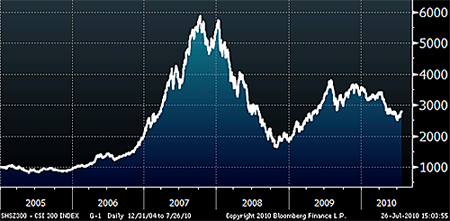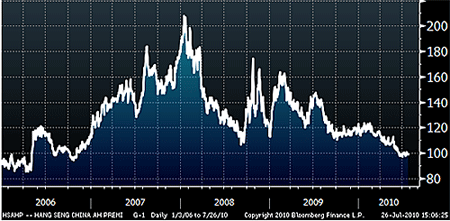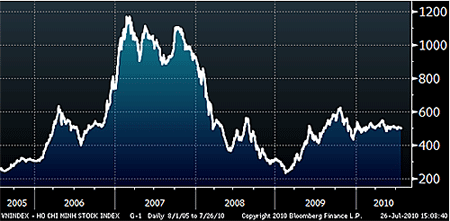Is it time to invest in Chinese A-shares?
Mainland Chinese stocks look more reasonably priced than they have in a long time, says Cris Sholto Heaton. And a slew of trackers has launched to let foreign investors take a punt. But it's not time to buy yet – here's why.

Get the latest financial news, insights and expert analysis from our award-winning MoneyWeek team, to help you understand what really matters when it comes to your finances.
You are now subscribed
Your newsletter sign-up was successful
Want to add more newsletters?

Twice daily
MoneyWeek
Get the latest financial news, insights and expert analysis from our award-winning MoneyWeek team, to help you understand what really matters when it comes to your finances.

Four times a week
Look After My Bills
Sign up to our free money-saving newsletter, filled with the latest news and expert advice to help you find the best tips and deals for managing your bills. Start saving today!
China is slowing down.
Fears of overheating have given way to concerns about the possibility of a hard landing. That looks unlikely. But it certainly isn't the best backdrop for the stock market in the short term.
However, this could be good news for long-term investors. Chinese firms listed in Shanghai (known as A-shares) are trading at some of their lowest valuations ever. And the number of exchange-traded funds (ETFs) that enable foreigners to invest in them is growing by the week.
MoneyWeek
Subscribe to MoneyWeek today and get your first six magazine issues absolutely FREE

Sign up to Money Morning
Don't miss the latest investment and personal finances news, market analysis, plus money-saving tips with our free twice-daily newsletter
Don't miss the latest investment and personal finances news, market analysis, plus money-saving tips with our free twice-daily newsletter
So is it a good time to invest? Do the usually pricey A-shares finally represent good value?
Some quick background on Chinese shares
First off, there are several different kinds of shares that can be called 'Chinese'. I'm talking about one type in particular and it's important to be aware of the differences. So let me recap briefly.
I'm talking about A-shares. These are traded on the two mainland Chinese stock exchanges in Shanghai and Shenzhen. They are priced in renminbi and for the most part, can only be bought by Chinese citizens and companies.
Foreigners usually invest through Chinese companies listed in Hong Kong. These are called H shares, Red chips or P chips. The exact name depends on where they are incorporated and whether they are state-controlled or private, but all are open to all investors. There are also a number of firms listed in Singapore (where they're called S chips), New York, and a handful in other international markets.
Finally, there's another class of shares called B-shares. These are listed on the mainland and priced in dollars (Shanghai) and Hong Kong dollars (Shenzhen). They were originally aimed at foreigners. But this market is virtually dead.
It's possible for a company to have A, B and H shares - many large ones do. But many firms are only listed on the mainland, including key players in popular sectors such as consumer goods.
So quotas that allow a limited number of qualified foreign institutional investors (QFII) to invest in A-shares are much sought after. Currently, total QFII quotas come to just $17bn.
Three reasons why foreigners are looking at A-shares
So why are A-shares suddenly potentially interesting?
First, they are relatively cheap by historical standards. The two mainland benchmarks, the Shanghai Composite and the CSI 300, have rarely traded on price/earnings ratios of less than 20. On occasion, they've gone over 60, as when the market blew up into a spectacular bubble in 2007 (see chart below).

But today, the CSI 300 is on a trailing p/e of 18.7 and an estimated one of 15.9.
To be fair, there might be question marks over the sustainability of some of the earnings. We know that many companies plunged into property development in the last year or so. With the government now clamping down, that may not look so smart.
But even allowing for this, A-shares are probably at a level where they could be viewed as an investment rather than just speculation.
Second, the gap between valuations on shares that have listings in both the mainland and Hong Kong (known as the A-H premium) has almost vanished. Again, this indicates that A-shares are becoming more reasonably priced by global standards.

That said, the A-H premium conceals a lot of variance. The average is close to zero. But at a sector level, things look very different. Overall, financials and materials are actually more cheaply priced on the mainland than in Hong Kong, while transport-related stocks tend to trade at a premium in Shanghai.
Third, access to A-share indices is becoming much easier. Until relatively recently, there were only a couple of dedicated products. You had a US listed closed-end fund called the Morgan Stanley China A Share Fund, and the Hong Kong-listed iShares FTSE/Xinhua China A50 Index ETF.
But in the last few months, there's been a flurry of new products. This includes a full range of sector ETFs from iShares and Deutsche Bank's x-trackers business.
Expert tips & advice for investing in Asia! Claim your FREE guides from MoneyWeek that include:
- How to go about investing to Asia
- Which brokers to use to buy foreign shares
A couple of local firms have got in on the act too. There's a consumer ETF from Da Cheng and a fundamentally-indexed product from Ping An. (If you're not familiar with fundamental indexing, it weights companies by factors such as earnings rather than by market cap - it's a bit like a mechanical value investing strategy.)
table.ben-table table { border: 1px solid #2b1083;font: verdana, arial, sans-serif; }
th { background: #2b1083; padding: 2px 1px;color: white;font-weight: bold;text-align: center;border-left: 1px solid #a6a6c9; font-size: .8em;}th.first { border-left: 0; padding: 2px 1px;text-align: left; font-size: .8em;}
tr {background: #fff;}
tr.alt {background: #f6f5f9; }
td { padding: 2px 1px;text-align: center;border-left: 1px solid #a6a6c9;color: #000;vertical-align: center; font-size: .8em;}td.alt { background-color: #f6f5f9; }
td.bold { font-weight: bold;}
th.date { font-size: .7em;}td.first { text-align: left; }
td.left { text-align: left; }
td.bleft{ text-align: left; font-weight: bold; }
| China A-share Funds | ||
|---|---|---|
| Exchange-traded funds (market) | TER | Listed |
| Exchange-traded finds (sector/style) | TER | Listed |
| Closed-end funds | TER | Listed |
| Row 3 - Cell 0 | ||
| BOCI-Pru WISE CSI300 China Tracker | 1.39% | HK |
| BOCI-Pru WISE SSE50 China Tracker | 1.39% | HK |
| CICC SZSE 100 | 1% | HK |
| db x-trackers CSI300 | 0.50% | HK, SG |
| iShares FTSE/Xinhua A50 | 0.99% | HK |
| iShares CSI 300 A-Share Index | 0.99% | HK |
| Nikko Listed Index Fund China A Share | 0.95% | JP |
| Nomura SSE 50 | 1.00% | JP |
| Polaris WISE CSI 300 | 1.39% | TT |
| UOB United SSE 50 China | 0.95% | SG |
| Row 14 - Cell 0 | Row 14 - Cell 1 | Row 14 - Cell 2 |
| Da Cheng CSI China Consumer | 0.99% | HK |
| db x-trackers CSI300 Real Estate | 0.50% | HK |
| db x-trackers CSI300 Financials | 0.50% | HK |
| db x-trackers CSI300 Industrials | 0.50% | HK |
| db x-trackers CSI300 Energy | 0.50% | HK |
| db x-trackers CSI300 Consumer Disc. | 0.50% | HK |
| db x-trackers CSI300 Utilities | 0.50% | HK |
| db x-trackers CSI300 Healthcare | 0.50% | HK |
| db x-trackers CSI300 Banks | 0.50% | HK |
| db x-trackers CSI300 Materials | 0.50% | HK |
| db x-trackers CSI300 Transportation | 0.50% | HK |
| iShares CSI A-Share Financials | 0.99% | HK |
| iShares CSI A-Share Infrastructure | 0.99% | HK |
| iShares CSI A-Share Materials | 0.99% | HK |
| iShares CSI A-Share Energy | 0.99% | HK |
| iShares CSI A-Share Consumer Staples | 0.99% | HK |
| iShares CSI A-Share Consumer Disc. | 0.99% | HK |
| Ping An PAragon CSI RAFI 50 | 1.39% | HK |
| Row 33 - Cell 0 | Row 33 - Cell 1 | Row 33 - Cell 2 |
| Morgan Stanley China A-share Fund | 1.74% | US |
A few problems with the A-share market
So A-share investment is looking more attractive to foreigners. And providers are starting to push it. But are they a good buy? I remain unconvinced, for a couple of reasons.
First, governance and accounting rules in mainland China are not that strong. Now, these ETFs will be investing in the largest companies, which should at least be among the better ones on those standards. But make no mistake, investing in A-shares definitely adds risk compared to investing in Hong Kong-listed firms.
Also remember that many of these firms are government controlled and won't necessarily put shareholders' interests first. The same is true of most of the firms in popular ETFs of Hong Kong-listed Chinese companies, such as the iShares FTSE/Xinhua China 25, which I've criticised in the past: Be wary when buying emerging market ETFs.
But there's perhaps an even bigger problem, which reflects the lack of maturity in mainland capital markets. Shanghai's stockmarket was shut down in the early 1950s after the communists won the civil war. The new one was only established in 1990. So there isn't a long history of investing in equities.
Policymakers have done a great deal to establish a financial infrastructure for China in the last couple of decades. There are now a range of local mutual funds and ETFs, and a qualified domestic institutional investor scheme (QDII) allows mutual funds to invest in overseas stocks.
However, the mainland market is still much more about gambling and short-term speculation than long-term investment. So fundamentals (or what's going on in the economy) are basically irrelevant in determining what happens in the market.
So although A-shares look cheaper, that doesn't necessarily mean they'll go up any time soon. The early days of the US stockmarket in the late 1800s show how shares in a developing market with no long-term investment culture can go through decades of sharp rallies and slumps without ever entering a true long-term bull market.
The fact that the Chinese market had that huge bubble in 2007 makes me especially concerned. The aftermath of a bubble often takes several years of range-bound trading to play out fully. I'd prefer to buy in very cheaply to reflect that.
A-share products won't improve the market
And these new A-share products won't fix the flaws in the mainland market. A lack of direct access to the market, means these ETFs don't directly buy and sell A-shares. Instead they're built using derivatives. These are either issued by an institution that has an A-share quota and is willing to 'rent out' the exposure that gives, or by one that's willing to take the other side of the bet (i.e. the ETF bets that A-shares will rise and its counterparty bets they will fall).
That's a crucial point. Direct trading might help the A-share market become more rational - it would immediately lead to money flowing out of overvalued assets and into undervalued ones. But these products don't do this. An A-share ETF user isn't participating in the market as much as betting on it.
It may sound trivial. But it's not. It means that A-share investors are also betting that the mainland market will become more rational of its own account, rather than directly contributing to the process. If foreigners had freer access to A-shares, they might play a part in this by taking a long-term, fundamentally-orientated view compared to local investors. But that opportunity is a long way off.
Incidentally, because of this structure, A-share ETFs routinely trade at premium or discount to the underlying value of their assets. That's because unlike with most trackers, institutional investors can't arbitrage away the difference and bring the prices back into line, because they can't trade in A-shares.
At present, most products are trading at a premium: 13.5% in the case of the iShares FTSE/Xinhua China A50, the most popular product. So if you buy into an A-share ETF, you're paying more than the underlying assets are worth for the privilege of getting access.
A-shares don't yet offer compelling value
I like the idea of being able to invest in mainland stocks. And valuations are getting close to the point where this isn't daft. But they're not a good deal right now.
It seems especially difficult to justify when compared to Vietnam, for example. This is another immature market that recently went through a bubble (see chart below). But it is at least more open to foreign investors.

Currently, the VN Index trades on a trailing p/e of 11.1 and a forward p/e of 10.4. And Vietnam is available through closed-end trusts like the Vietnam Opportunity Fund or the (highly illiquid) PXP Vietnam Fund. These offer a discount of more than 30% to the value of their assets, meaning that you can buy in at even lower valuations.
It's good to see investors being offered a broader range of Asian ETFs. But I hope that with A-share sector ETFs now available, providers will turn their attention elsewhere rather than just trying to copy each other.
I'd be more interested to see sector ETFs appear for other Asian markets or for the region as a whole. If A-shares got cheaper still and the ETFs flipped to a discount during the next panic, I might consider them - but not yet.
Get the latest financial news, insights and expert analysis from our award-winning MoneyWeek team, to help you understand what really matters when it comes to your finances.

Cris Sholt Heaton is the contributing editor for MoneyWeek.
He is an investment analyst and writer who has been contributing to MoneyWeek since 2006 and was managing editor of the magazine between 2016 and 2018. He is experienced in covering international investing, believing many investors still focus too much on their home markets and that it pays to take advantage of all the opportunities the world offers.
He often writes about Asian equities, international income and global asset allocation.
-
 How to navigate the inheritance tax paperwork maze in nine clear steps
How to navigate the inheritance tax paperwork maze in nine clear stepsFamilies who cope best with inheritance tax (IHT) paperwork are those who plan ahead, say experts. We look at all documents you need to gather, regardless of whether you have an IHT bill to pay.
-
 Should you get financial advice when organising care for an elderly relative?
Should you get financial advice when organising care for an elderly relative?A tiny proportion of over 45s get help planning elderly relatives’ care – but is financial advice worth the cost?